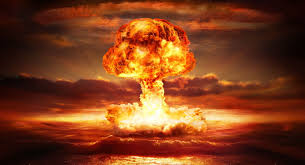What are weapons of mass destruction? What are the types of weapons of mass destruction? - Thanh Huyen (Quang Nam, Vietnam)

What are weapons of mass destruction? Regulations on weapons of mass destruction in Vietnam (Internet image)
1. What are weapons of mass destruction?
According to Clause 1, Article 4 of Decree 81/2019/ND-CP, weapons of mass destruction refer to weapons that are developed or manufactured capable of inflicting serious damage on a large scale, capable of destroying or causing heavy casualties regarding humans, technical equipment, facilities, buildings, environment and ecosystem, and terrorizing humans mentally and psychologically.
2. Regulations on weapons of mass destruction in Vietnam
Weapons of mass destruction include: nuclear weapons, radiological weapons, chemical weapons, biological weapons and other weapons with functions and use similar to those of weapons of mass destruction.
Specifically:
- Nuclear weapons refer to weapons utilizing energy released by uncontrolled nuclear fission reactions and nuclear fusion reactions.
Primary damaging factors include shockwave, optical radiation, penetrating radiation, radioactivity and electromagnetic pulse; nuclear warheads, means of delivering them to targets and control systems are inseparable from the nuclear weapons.
- Radiological weapons refer to weapons utilizing radioactive materials to inflict casualties via ionizing radiation which causing radioactive contamination in surrounding environment, technical equipment and other entities.
Radioactive materials can be obtained from products of nuclear reactors or synthesized. Radiological weapons include ammunition containing radioactive materials, means of delivering them to targets or other equipment for spraying and spreading.
Radiological weapons inflict damage by external exposure and internal exposure to radiation, harming body organs and causing radiation sickness.
- Chemical weapons refer to weapons utilizing high toxicity and instantaneous reaction of chemical substances. Chemical weapons include toxic chemicals, objects utilizing the toxic chemicals such as ammunition and means of delivering the toxic chemicals to targets.
Chemical weapons can produce severe effect in terms of nature and casualties on a large scale and over an extended period of time; prove extreme severity and hindrance to timely detection; cause difficulty and complicate preventing, countering and remediating consequences; impose great harm to the environment, ecosystem and negatively impact human lives and health.
- Biological weapons refer to weapons utilizing pathogenicity or infectivity of biological agents capable of causing lethal epidemics to humans, animals and plants.
Biological weapons include biological agents such as germs, viruses, fungi, toxin and objects utilizing the biological agents such as ammunition or means of delivering the biological agents to targets.
(Clause 2, 3, 4 and 5 Article 4 of Decree 81/2019/ND-CP)
3. Principles of preventing and countering proliferation of weapons of mass destruction in Vietnam
Specifically, in Article 5 of Decree 81/2019/ND-CP, the principles of preventing and countering proliferation of weapons of mass destruction in Vietnam include:
- Comply with the Constitution, regulations and law; ensure independence, sovereignty, unification and territorial integrity, interest of Government, legal rights and interest of agencies, organizations and individuals;
- Comply with international agreements to which the Socialist Republic of Vietnam is a signatory; take charge preventing, detecting, deterring, combating and taking actions against the proliferation and financing the proliferation of weapons of mass destruction; combine preventing and countering the proliferation and financing of the proliferation of weapons of mass destruction with enhancing socioeconomic development, and maintaining national defense and security.
- Ensure caution, positivity, engagement and timeliness in cooperation in taking actions and handling issues relating to preventing and countering proliferation of weapons of mass destruction; perform joint state management on national security, social order, safety and national defense tasks in accordance with joint direction and coordination of Government;
- Ensure close cooperation among law enforcement forces in conducting tasks of ministries and local authorities in accordance with functions, tasks, powers and organizations prescribed by relevant law provisions.
- Respect and preserve assets, rights and interest of a legal third party as per the law; compensate for damage regarding assets and interests of individuals and organizations caused by violations against the law of competent agencies and organizations during implementation of measures to prevent and counter the proliferation of weapons of mass destruction as per the law;
- Take actions against violations regarding preventing and countering the proliferation of weapons of mass destruction and assets related to the weapons of mass destruction as per the law.
Thanh Rin
- Key word:
- weapons of mass destruction in Vietnam
 Article table of contents
Article table of contents





.Medium.png)
.Medium.png)
.Medium.png)
.Medium.png)
